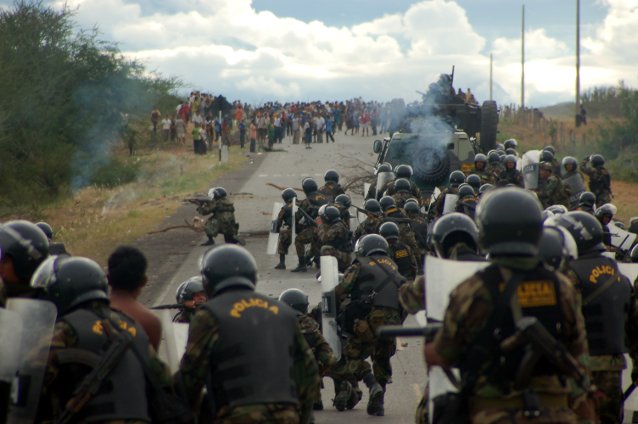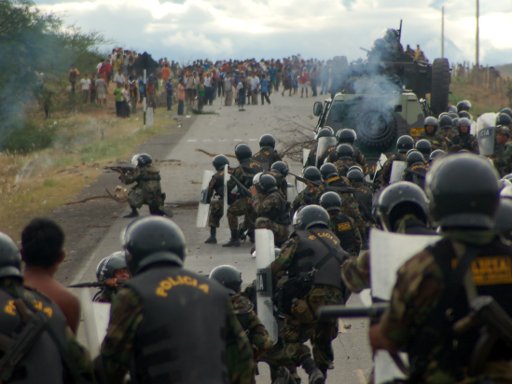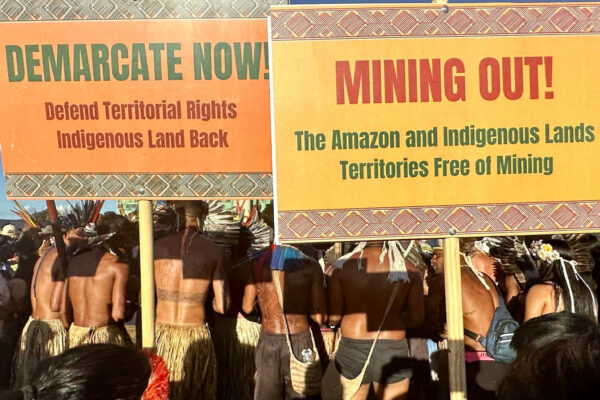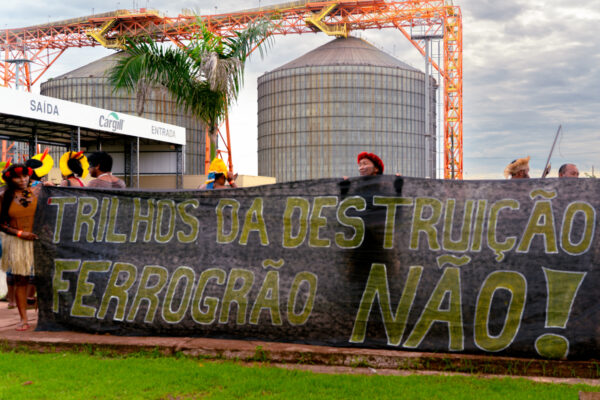
Five years ago today the Devil’s Curve earned its name. This wild stretch of highway outside the Peruvian town of Bagua was transformed from a peaceful protest site into a national tragedy now known as the Baguazo. Though the multi-week roadblock was due to disband that same day, militarized riot police entered by force in the early dawn and a deadly melee ensued. When the teargas and gunsmoke cleared, 34 people were dead and hundreds more wounded, including protesters and police officers.
Today, 54 protesters and ostensible instigators are on trial for the infamous Baguazo. Government prosecutors have accused high-profile indigenous leaders of inciting their people to violence. Several indigenous representatives like Alberto Pizango, president of the Amazon-wide indigenous organization AIDESEP, face sentences of 35 years to life.
The trial in progress claims that the indigenous protesters are solely responsible for what happened five years ago. But what about the government that ordered the police SWAT teams to confront them with force? At the trial’s opening this past month, defense lawyers called for former Peruvian President Alan Garcia and several ministers to at least be subpoenaed for testimony. But the judges refused, perhaps agreeing with the General Prosecutor’s spurious rationale that “you can’t put a nation on trial.” The fact that the government officials weren’t even present in Bagua on June 5th, 2009 was also cited, a factor also relevant to a number of the accused indigenous leaders currently on trial.
The “political responsibility” of the Garcia government for Bagua is hotly debated within Peru, as evidenced by recent commentary from current President Ollanta Humala (whose wife, Nadine Heredia, will likely face Garcia in the 2016 presidential election). Conveniently forgotten in this debate has been the role of international players like the U.S. government and multinational corporations in pushing the situation forward inexorably toward the predictable massacre that ultimately took place.
Given that the indigenous peoples were protesting new laws issued in 2008 to ostensibly facilitate the United States-Peru Trade Promotion Act (also known as the Free Trade Agreement – FTA), there is a broader responsibility that we bear here in the United States. Though a number of these laws sparked Amazon-wide protests in 2008 and then again in 2009 after the laws were declared unconstitutional by the Peruvian Congress, the U.S. Embassy did little publicly to help de-escalate the situation. Did the Peruvian government feel that they had a “get out of jail free” card from the U.S.?
North American corporations hungry for Peru’s natural resources haven’t helped the situation either. Many of the people who took to the streets in Peru’s 2009 indigenous protests had prior negative experiences with mining and oil companies like Afrodita, Talisman Energy, and LA-based oil major Occidental. Corporations regularly employ divide-and-conquer strategies in the Peruvian Amazon to facilitate industrial-scale natural resource extraction within indigenous territories. Many of those same companies would stand to benefit from the new FTA laws, designed to favor investor rights over the fragile rights of local communities.
Five years later, it seems few lessons from Bagua have been learned. A Prior Consultation law was brought into effect in 2011 by the Peruvian government, but its implementation has been selective and rocky at best. Meanwhile, indigenous protests continue in response to natural resource extraction projects such as the Conga mega-mine (operated by U.S.-based corporation Newmont Mining). Such actions are still met with deadly repression of protesters as well as legal persecution of movement leaders.
At the same time, the Bagua trial continues to advance with an uncertain future for the accused indigenous leaders. The likelihood of a grave injustice – many people sent to jail for unproven crimes – is frighteningly real. And a parallel injustice – impunity for the powerful individuals and institutions that helped set the stage for the Bagua tragedy – is all but guaranteed.














